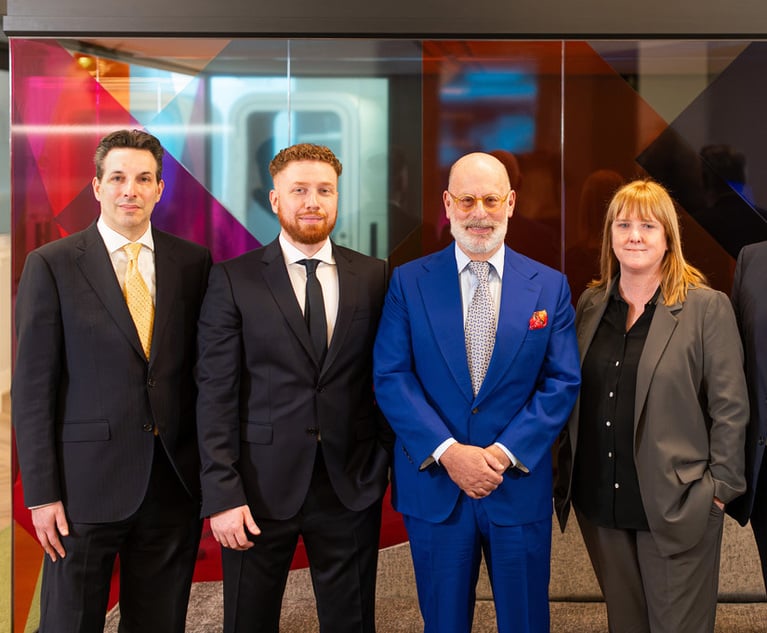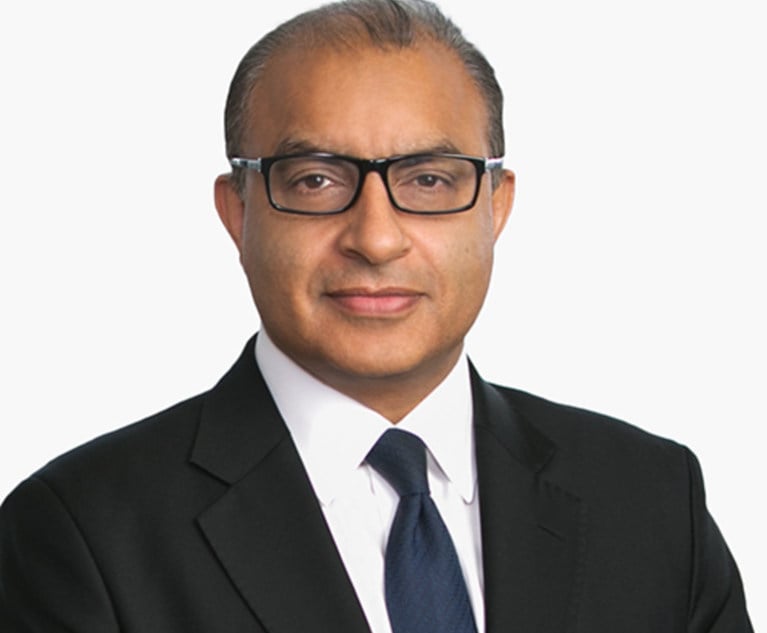Sustainability, Generation Z and a European Recession? Law Firm Leaders Look To The Future
Linklaters, Macfarlanes and Travers Smith leaders among those discussing what will be on their agendas in 2020.
January 02, 2020 at 04:23 AM
10 minute read
Many law firms have spent recent years looking towards their 2020 visions – but as we usher in the new decade, their leaders are now thinking beyond that. Topics high on their agendas include sustainability, well-being, and a desire to shift from a purely economic driven model.
Both Joe Andrew, Dentons' chairman and Mark Rigotti, Herbert Smith Freehills' CEO, express hopes that the industry will spend the coming years thinking more holistically about how to retain talent. Rigotti said: "…there is an opportunity for firms to provide a broader purpose that employees can identify with and support – alongside sensible compensation levels."
Andrew argues for a dramatic shift away from the current 'up or out' system currently prevalent at most firms. He said: "A decade later this current obsession with a 'tournament of champions' will be viewed very differently."
Other leaders surveyed for their predictions include Travers Smith senior partner Kathleen Russ, Clifford Chance managing partner Matthew Leyton and Baker McKenzie chair Milton Cheng.
Russ expects to see more of a focus on sustainability – both by firms and their clients – as well as firm's putting their staff and lawyers' well-being at the forefront of their businesses.
Keep reading for more of their thoughts – and those of other leaders at firms including Linklaters, Freshfields Bruckhaus Deringer and Latham & Watkins.
Kathleen Russ, Travers Smith senior partner 
"I think there will be a significant focus around sustainability for the whole industry – both in how law firms think about themselves and how they advise clients. It mirrors the overall feeling of corporates and asset managers more generally and that focus will continue to feed into how firms think.
Well-being is a core factor for law firm leaders to think about. Maintaining mental resilience in law is challenging and I think it's hugely important to all those who work in law firms – not just lawyers – that we support them. Law is a long career and you need to help people through any periods of difficulty they might encounter.
There will be an increasing trend of firms looking at their legal operations and how they work. Rather than thinking about Generation Z as a problem, law firms should be thinking about how they can use their skills as a positive. We should be leveraging the skill set and harnessing the ambition of the younger generation.
I'm interested in the Big Four's progress and how they'll continue that next year. But it's a watching brief, rather than that I'm hugely concerned about them."
Bruce Embley, Freshfields Bruckhaus Deringer co-head of global M&A client group 
"Is there going to be a change in the world order? The world is focused on what's going on in Hong Kong—a key financial hub. If Hong Kong's influence is eroded, we could see a power-shift.
We've done Brexit to death. But what's happening now in Hong Kong is just as big. So for me there are two big situations: whether the Hong Kong situation will stabilise, and where we are going to end up with the U.S. elections. Will we see five more years of Trump policies? He's a businessman, and while some issues have been harder to predict, broadly the Trump administration is seen as creating a fertile place for M&A."
Michael Chissick, Fieldfisher managing partner 
"As a sector, we're often the canary in the coal mine. We sense transactional activity early on, we pick up on insolvency work, we see deals being pulled… There are signs of a European recession, so it could be a challenging year. But I don't want to be pessimistic. We've had a funny year and we haven't had a steady run of economic data. We've not seen the full impact of Brexit yet.
A pan-European service will be key and firms will be looking at how they're structured. For us, Dublin has been very busy. And Amsterdam and Germany have been obvious beneficiaries. Firms will want to keep a foothold in the EU. Ireland is the English-speaking gateway into the EU—it's a key part of the equation."
Charles Martin, Macfarlanes senior partner 
"The recruitment market will become increasingly selective. It will not be hot across the board but certain practice areas and levels of experience will be in great demand from both US and European firms. The idea of merger as a panacea is clearly out of fashion. Any mergers are going to have to produce serious client benefits and have sound commercial rationale."
"Well-being is high on everybody's agenda and rightly so. Historically it has not received enough focus and I have little doubt that it will be an important area for everyone from now on."
Joe Andrew, Dentons global chair 
"The biggest issue for firms to consider is what clients want in a lawyer in the future, and why there is still a gap between what clients expect and what lawyers provide. Why are some law firms producing some people that clients say they're not looking for? Law firms' current organisational structure do not produce the lawyers clients are increasingly after. Currently, the focus is overwhelmingly on economic contribution. The industry produces lawyers very good at internal competition – why would we think that would produce someone with good emotional intelligence?
A decade later this current obsession with a 'tournament of champions' will be viewed very differently. The goal should be to keep everyone who starts at a firm, not weed them out. Firms over the next decade should focus on finding the right place to put those people. My goal is to change the very nature of what we're doing."
Catherine Drinnan, Latham & Watkins London deputy managing partner
"We are excited about the emergence of an unprecedented number of new products in the legal tech market. The influx of new technology allows law firms to adopt cutting edge tools designed for how lawyers work. We foresee continued growth in this area and maintain active involvement in the evaluation of these tools as they develop and reach operational maturity. Our clients are particularly interested in the dialogue around emerging technology.
We think the legal tech market will continue to expand, with more tools designed for specific practice areas, industries, and bespoke workflows using artificial intelligence and legal analytics. Tools that helps firms and clients better understand and access large volumes of data in meaningful ways, automate workflows and enhance collaboration will be critical in the future."
Alastair Morrison, Pinsent Masons Head of Client Strategy
"I think for law firms, the trend will continue will be what you do to stay relevant and provide help for your clients. Law is at the core of what we do, but what are the adjacent skills that are relevant, and how do they collaborate. Some firm talk about lawyers and non-lawyers but that just doesn't work. You need to have the necessary professionals together to deliver.
I think the Big Four showed the way on that – they showed they're no longer accountants and non-accountants – it's just not like that. They are professional services organisations with finance at its core, we have to be professional services with law at our core."
Matthew Layton, Clifford Chance global managing partner
"Disruption is the new normal, from international trade disputes, to national exceptionalism, to technological transformation of entire sectors. We will continue to invest to ensure that we are best placed to help our clients navigate the turbulence."
"Dealing with conduct issues is not about reaching a destination where we say 'we have the right rules and processes in place so we can move on'. Our clients, people, regulators, and wider society are all on a journey, and it is important that law firms are clear on their values, embed them, and use them to drive the way we work forward so we don't get left behind."
Gideon Moore, Linklaters managing partner
"The industry will see even greater use of technology but we still see that our clients invariably want the advice delivered to be from a lawyer they trust, in person – and there's no technological alternative to that.
What I expect, however, is that we will see lawyers far more adept at working with technology to deliver our service faster and more efficiently while also developing new products that combine the best of AI and human intelligence."
Milton Cheng, Baker McKenzie global chair
"2020 is likely to continue the theme of the last few years. A volatile and at times uncertain macro-economic picture will mean clients look for more proactive and more pragmatic advice. And firms will have to get that blend of global expertise and local knowledge exactly right.
There is also no doubt the increased competition we are seeing from other organisations, whether traditional competitors or newer rivals, will intensify. That will put additional pressure on law firms who don't look to innovate their service offerings and their business models."
Mark Rigotti, Herbert Smith Freehills CEO
"In terms of hiring, the traditional model is breaking down. The link between pay, productivity and return on investment in our most junior people is under strain. We are in the midst of a compensation arms race. However, in a world where Purpose is becoming increasingly important and profit is not the only key driver, there is an opportunity for firms to provide a broader purpose that employees can identify with and support – alongside sensible compensation levels. Purpose can be a magnet around which people come together to take the business forward.
We could see more cross-Atlantic mergers if and where client demands support it. Generally, firms need to be clear on their rationale for merging – is it access to new markets? Access to clients? Because they want to reform their business model? If a merger isn't possible, some may choose to be more like a US firm, or to form joint ventures and alliances where they work with a US and to solve the issues outside the US for them.
There is increased demand for more meaningful employment; more focus on workplace diversity and quality of life inside and outside of work; increased transparency of career options and trade-offs; and greater willingness to change employment and take risk. All of these factors put traditional career paths and leverage-based business models under strain – although done well these things should enhance productivity (via greater engagement) and not dilute it."
This content has been archived. It is available through our partners, LexisNexis® and Bloomberg Law.
To view this content, please continue to their sites.
Not a Lexis Subscriber?
Subscribe Now
Not a Bloomberg Law Subscriber?
Subscribe Now
NOT FOR REPRINT
© 2025 ALM Global, LLC, All Rights Reserved. Request academic re-use from www.copyright.com. All other uses, submit a request to [email protected]. For more information visit Asset & Logo Licensing.
You Might Like
View All

Rosenblatt Breaks Away From RBG, Becomes 40-Strong Standalone Firm

Law Firms Mentioned
Trending Stories
- 1Uber Files RICO Suit Against Plaintiff-Side Firms Alleging Fraudulent Injury Claims
- 2The Law Firm Disrupted: Scrutinizing the Elephant More Than the Mouse
- 3Inherent Diminished Value Damages Unavailable to 3rd-Party Claimants, Court Says
- 4Pa. Defense Firm Sued by Client Over Ex-Eagles Player's $43.5M Med Mal Win
- 5Losses Mount at Morris Manning, but Departing Ex-Chair Stays Bullish About His Old Firm's Future
Who Got The Work
J. Brugh Lower of Gibbons has entered an appearance for industrial equipment supplier Devco Corporation in a pending trademark infringement lawsuit. The suit, accusing the defendant of selling knock-off Graco products, was filed Dec. 18 in New Jersey District Court by Rivkin Radler on behalf of Graco Inc. and Graco Minnesota. The case, assigned to U.S. District Judge Zahid N. Quraishi, is 3:24-cv-11294, Graco Inc. et al v. Devco Corporation.
Who Got The Work
Rebecca Maller-Stein and Kent A. Yalowitz of Arnold & Porter Kaye Scholer have entered their appearances for Hanaco Venture Capital and its executives, Lior Prosor and David Frankel, in a pending securities lawsuit. The action, filed on Dec. 24 in New York Southern District Court by Zell, Aron & Co. on behalf of Goldeneye Advisors, accuses the defendants of negligently and fraudulently managing the plaintiff's $1 million investment. The case, assigned to U.S. District Judge Vernon S. Broderick, is 1:24-cv-09918, Goldeneye Advisors, LLC v. Hanaco Venture Capital, Ltd. et al.
Who Got The Work
Attorneys from A&O Shearman has stepped in as defense counsel for Toronto-Dominion Bank and other defendants in a pending securities class action. The suit, filed Dec. 11 in New York Southern District Court by Bleichmar Fonti & Auld, accuses the defendants of concealing the bank's 'pervasive' deficiencies in regards to its compliance with the Bank Secrecy Act and the quality of its anti-money laundering controls. The case, assigned to U.S. District Judge Arun Subramanian, is 1:24-cv-09445, Gonzalez v. The Toronto-Dominion Bank et al.
Who Got The Work
Crown Castle International, a Pennsylvania company providing shared communications infrastructure, has turned to Luke D. Wolf of Gordon Rees Scully Mansukhani to fend off a pending breach-of-contract lawsuit. The court action, filed Nov. 25 in Michigan Eastern District Court by Hooper Hathaway PC on behalf of The Town Residences LLC, accuses Crown Castle of failing to transfer approximately $30,000 in utility payments from T-Mobile in breach of a roof-top lease and assignment agreement. The case, assigned to U.S. District Judge Susan K. Declercq, is 2:24-cv-13131, The Town Residences LLC v. T-Mobile US, Inc. et al.
Who Got The Work
Wilfred P. Coronato and Daniel M. Schwartz of McCarter & English have stepped in as defense counsel to Electrolux Home Products Inc. in a pending product liability lawsuit. The court action, filed Nov. 26 in New York Eastern District Court by Poulos Lopiccolo PC and Nagel Rice LLP on behalf of David Stern, alleges that the defendant's refrigerators’ drawers and shelving repeatedly break and fall apart within months after purchase. The case, assigned to U.S. District Judge Joan M. Azrack, is 2:24-cv-08204, Stern v. Electrolux Home Products, Inc.
Featured Firms
Law Offices of Gary Martin Hays & Associates, P.C.
(470) 294-1674
Law Offices of Mark E. Salomone
(857) 444-6468
Smith & Hassler
(713) 739-1250














